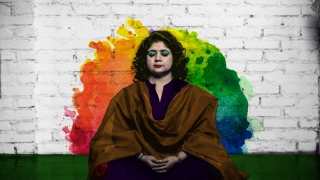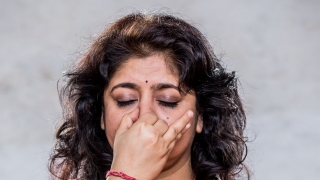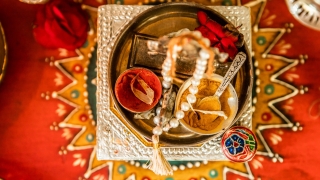Word-Meaning: The word "deepa" means a clay oil lamp. Deepawali means a row of lights.
Symbolic meaning: Deepawali marks the establishment of dharma that allows the awakening of our highest potential. This festival celebrates the illumination of human being to the level of humanity and from humanity to divinity. It is a battle between our dark and bright tendencies, choices and inclinations. May the goodness, righteousness, virtue and light win the heaviness of darkness.
The festival lasts for 5 days where each day has a special symbolic meaning and rituals associated with it. The homes, work places, city, bazaars, temples are all decorated with lights and decorations. The festival brings the community together in the spirit of growth, prosperity, health and happiness.
Let us talk about what happens each day during these five days:
Day 1, Dhanteras: This day is celebrated as the invitation of prosperity, wealth (Dhan) and abundance in our lives. Celebrated on the 13th day of the Waning crescent.
The Vedic texts talk about the churning of the milky ocean which brought gifts of life, health, treasures, immortality. It is also celebrated as the Ayurveda Day. Lord Dhanwantari was born out of the milky ocean.This God symbolizes Ayurveda - the art and science of longevity and life. Money indeed is power, material goods do represent prosperity and wealth. However isn’t the health our real measure of wealth, abundance and prosperity?
Ritual:
- Do something that shows your commitment to your health- the real wealth! Do you follow a dinacharya? Maybe its time to start it or time to keep it consistent!
- In Bharat Varsha (India), people buy precious metals (gold, silver, copper), jewelry or kitchen utensils to celebrate this day and invite prosperity in their lives. How about YogaShri Mala (it is my favorite piece of mindful jewelry) which is designed keeping the Ayurvedic principles of Tridosha and Yogic principles of detachment and practice.
Happy Dhanwantari Day! Happy Dhanteras! May this day bring health, prosperity and abundance to you and your loved ones!
Day 2, Choti Diwali (Little Diwali)
The 14th day of waning crescent is like a teaser of the main Diwali celebration. It is known by 3 names: Narak Chaturdashi, Kali Chaudas and Roop Chaudas
As Kali Chaudas or Narak Chaturdashi, it represents the victory of Goddess Kali over the demon of laziness, wickedness and evil doings (Naraka-Asura). For this reason at dawn 5 or 7 cotton wicks, soaked in mustard oil, are lit to consume the demon of darkness.
This day is Roop Chaudas - the 14th day of beautification.
Rituals- Su-Prabhata Dinacharya: Wake up at sunrise and do full body oil massage (Abhyanga). Apply fragrant herbal powders on the face and full body for cleansing and beautification. Have you tried Yogis Glow? It is a combination of fragrant and healing powdered flowers, herbs, spices and fruits. Use Yogis Glow to massage the body after oiling and take a warm bath today. Both these rituals bring beauty, radiance, fragrance and lusture to the body.
A verse from Tantrokta Ratri-Suktam on beauty:
Shreem-Om saumyā saumyatarā śheṣha - saumyebhyas tv-ati-sundarī parāparāṇāṁ paramā tvam-eva parameśvari- Shreem
May you be beautiful inside-out!
Happy Choti Diwali!
PS: Yogis Glow is a 3 in 1 Ayurvedic wash, exfoliant and mask by Indu Arora. How to use it- read here.
Day 3, Diwali- Festival of lights
It is the day when we celebrate light in the darkest of the nights (15 Lunar day, New Moon). This light is hope, abundance, prosperity, wealth, courage, loving bonds and beauty. May the light hidden deep in the caves of our heart bring radiance to us and the world. May it shine the darkest corners of our minds with hope and love.
Ritual:
- Goddess Laxmi and God Ganesha are worshipped in ritualistic way with Mantra, flowers, incense, ghee lamps, sweets, coconut and chanting of art (circumbulation of the diety with a clarified butter lamp, while singing the praise of the diety)
- Chant the Laxmi mantra with Lotus seed mala in the evening to invite abundance and prosperity in your life.
|| Om Shreem Mahalaxmi Namaha ||
I pray this Deepawali (festival of lights)
May any darkness in our hearts be
Smeared with the fragrant Sandalwood
Washed by the pure waters of Ganges
Burnt to ashes by the fire of Tapas
Dissolved in air by the cosmic Prana
Expand to nothingness in the Space
May our hearts become the temple that We wish for it to be
May We free our SELF from ourselves!
Day 4, Govardhan Puja/ Vikram Samvat
On the first three days of Diwali we celebrate victory of light over dark, we invite abundance and prosperity. The fourth day is dedicated to thanksgiving, to show gratitude for the riches we have, for the food we eat, for the loved ones in life.
Ritual: Today, make food at home and with a feeling of gratitude offer it to the divine. If you have an altar keep some sweets, grains (cooked or uncooked), cooked savory food, nuts, fruits and water in front of it. May that food and riches multiply 1000 fold.
This day marks the beginning of Indian New Year known as Vikram Samvat.
Happy New Year!
Day 5, Bhai dooj/Tika
This is the last day of the five day festival. It is on the second day of the waxing crescent. This day is dedicated to celebrate the sibling bond. Happy sibling day. I hope that you take time to celebrate each other today, maybe a phone call, text, greeting card, a silent prayer or perhaps a gift to the one who has been a sibling by blood or choice to you.
Ritual: Brothers usually visit the sister’s home with gifts and the sister eagerly waits to put a red turmeric powder tilak (flame shaped) on their forehead with a couple grains of raw rice. The red color is for awakening the shakti and rice for a wish of abundance! Celebration of this bond is special. Siblings are the ones who know you in a way no ones else does. They are your secret keepers, your support and SOS capsule of laughter when needed the most.
May your Diwali be filled with light, gratitude and love!
Start your FREE subscription to Indu Arora's newsletter to get more on Yoga and Ayurveda here



